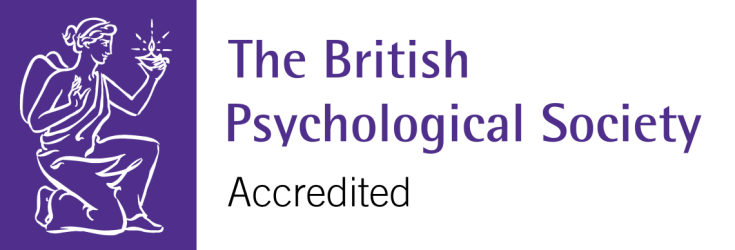Online MSc Psychology (Conversion) - BPS Accredited
Postgraduate degree
Unlock new career opportunities and deepen your understanding of psychology with our flexible, online MSc Psychology (Conversion) course. Our British Psychological Society-accredited psychology conversion course is delivered via distance learning and will equip you with the essential skills and knowledge to excel in a wide range of psychology careers and allow you to embrace your passion.
- Supported online learning gives you the flexibility to fit study around your other commitments
- Learn from expert staff who will guide your research interests
- Transform your undergraduate degree into a master’s in psychology online
- Open doors to a wide range of career paths and further specialised study
- Be part of the University of the Year (THE)
About your online Masters in Psychology (Conversion) course
Course highlights
- Develop a comprehensive understanding of the core areas of psychology
- Master the principles of research design and analysis in psychology
- Acquire the essential skills for conducting ethical research
- Accredited by the British Psychological Society (BPS) offering a pathway for Graduate Basis for Chartered Membership
How you'll study
This course is studied 100% onlineStudy over 2 years
Start in January, May or September
26th March 2026
Fees: £8,600
Course overview
In this BPS accredited psychology conversion course, you'll explore the various factors that shape human psychology, with a focus on how physiological processes influence behaviour, how chemicals in our bodies affect our actions, and how societal factors play a role in shaping our minds. You'll also examine how language can shape your perception of the world and understand the critical importance of childhood development.
As part of this online MSc Psychology (Conversion) programme, you'll gain practical experience in designing research projects—from initial concept to execution—and explore various research methods. You'll develop the necessary skills to manage projects ethically and professionally. You’ll also have the opportunity to conduct your own research project, acquiring the skills needed to register with the British Psychological Society (BPS) as a graduate member (note: a 50% pass mark in your degree is required for eligibility).
Study psychology online under research-active staff who are passionate about psychology and committed to helping you reach your potential. Whether you're new to psychology or have some prior knowledge, this online MSc Psychology (Conversion) course will help you build a strong foundation in the field, with a comprehensive approach that accommodates students from all backgrounds. Our psychology conversion course is specifically designed for graduates with a background in a different field, enabling you to transition into psychology and gain a comprehensive understanding of the subject. If you've studied psychology before, you may revisit some fundamental topics as part of your journey.
Please refer to the modules section to get a full description of what you’ll cover in each module.
Modules
Social Psychology, Development and Difference
In this course you will cover the main British Psychological Society taught content in terms of social psychology, developmental psychology, and individual differences. The module takes a lifespan developmental approach that considers brain, cognitive and social development from infancy through to old age, as well as theories of human psychological development, normative changes, atypical development, sources of individual differences, and influences of different social contexts. You’ll have the opportunity to apply academic knowledge to real world issues via case studies and problem based learning.
Brain, Body and Mind
Brain, Body and Mind draws heavily on psychobiology, neuroscience, individual differences and evolutionary approaches to provide a critical understanding of mind and behaviour. The module will provide you with a comprehensive and critical synthesis of how biology and evolutionary theory underpin human and animal behaviour before examining cognitive and individual difference models of the mind and behaviour. You’ll be challenged to analyse areas of human psychology from multiple perspectives and to show an integrated understanding of the area. The module is largely topic based, and you’ll address key areas of psychology from a variety of perspectives: Current cognitive theory, the biological underpinnings, evolutionary and genetic perspectives, individual differences and clinical issues. Topics will include areas such as perception, learning, memory, language, problem solving & decision making and consciousness and meta-cognition, intelligence and social cognition.
Research in Action: Qualitative Methods and Psychology in Principles
Research is key to psychology. Here you will learn the qualitative methods in psychology, looking at the design, collection, and analysis of qualitative data and key aspects of a qualitative approach, such as reflexivity and epistemology. You’ll collect and analyse qualitative data and use this to formulate research questions.
Research in Action: Statistical Thinking
Psychology requires you to develop a critical understanding of the principles of quantitative data collection and analysis, whilst considering the theory behind various methods. You’ll cover theoretical, conceptual, and ethical issues during lectures, with emphasis on the logic behind the techniques you are learning, enabling you to see when it’s appropriate to use a particular approach. The ideas covered in your lectures are brought to life using associated practical and computer examples, helping you to understand how the research choices you make affect your data analysis options and the power of your statistical tests. You will get hands-on experience with data analysis, gaining skills in using and interpreting output from statistical software.
Into ARU
Entering third level education is exciting; but it can also be a daunting experience. At ARU, we want all students to make the most of the opportunities Higher Education provides, so they reach their potential, become lifelong learners and find fulfilling careers. However, we appreciate that the shift from secondary education, or a return to formal education is quite a journey. This module is designed to ease that transition. You’ll be enrolled on it as soon as you receive an offer from ARU so you can begin to learn about university life before your course starts. Through Into ARU, you’ll explore a virtual land modelled around ARU values: Courage, Innovation, Community, Integrity, Responsibility, and Ambition. This innovative module is designed as a game, where you collect knowledge and complete various mini tasks. You’ll proceed at your own pace, though we expect you to have completed the Into ARU exploration by week 6. If you, for whatever reason, are unable to complete it by that date, you’ll be signposted to existing services so that we can be confident that you’re supported.
Contemporary Issues in Psychology
The aim of this module is to explore the unique solutions and approaches that psychologists and psychological research can bring to analysing contemporary real-world problems. For example, issues such as welfare, climate change, political conflict, behaviour in a health pandemic, and the effects of social media, are all public policy issues that psychologists can contribute to. Many current concerns of environmental and social welfare are strongly influenced by psychological factors and could benefit from psychological analysis.
The module will provide you with a grounding in key skills and research that address considering people, and their psychology, in relation to issues of contemporary concern and policy making. There are two strands to these skills: (a) critical understanding of psychological research methods and ethics, and (b) specific psychological knowledge and approaches relevant to policy making. Regarding the latter, some examples would be knowledge about the roles of self-regulation, motivation, identity, emotion, and culture.
The specific topics of the module vary depending on issues of contemporary concern, but some examples would be identity politics, wellbeing economics, political populism, disaster preparedness, social media, nationalism, conspiracy theories, and pandemic behaviour. In summary, the module looks at several topics of contemporary relevance and examines how psychologists can contribute to our understanding of them and what practical advice psychologists could give to policy makers.
Diagnosis and Formulation in Mental Health
You’ll be introduced to diagnosis and formulation in mental health, as well as a variety of mental health problems including anxiety, depression, psychosis and post-traumatic stress disorder. You’ll develop your knowledge of diagnostic classification of mental health problems and establish an understanding of theoretical explanations of mental health problems through formulation. You will also review current knowledge of aetiological factors in mental health problems, including biological, psychological and sociocultural factors. You’ll be taught the importance of understanding the individual beyond diagnosis, through applying formulation to case studies.
Psychology Dissertation
This module requires you to undertake a research project in the chosen field of study and to present the results of that research in a thesis prepared to the highest scientific professional standards. The research will normally be based on preparatory work undertaken in modules: Issues in Psychological Research and either The Research in Action modules or Essential Research Methods. The topic may be drawn mainly from a selection of suggested topics related to school research groups. A professional subject of interest will be considered provided that a strong case is made, and suitable supervision is available. These suggested project topics will be assessed for suitability. You’ll be assigned a supervisor, or, if appropriate, a supervisory team. You will be expected to make regular reports documenting progress. These reports will normally be in a written format suitable for incorporation into the final thesis.
Modules are subject to change and availability.
Assessment
How you'll study
Our online psychology degree conversion course is studied 100% online through flexible distance learning.
You’ll study through Canvas, our world-class online Learning Management System (LMS), which can be accessed from your phone, PC, or tablet, both at home or on the move. Canvas provides instant access to study materials, forums, and support from tutors and classmates, as well as enabling easy submission of your assignments.
On successful completion of your master’s degree in psychology, you’ll be invited to attend a graduation ceremony on campus. If attending the ceremony in person is not possible then we’ll arrange to have your certificate sent to you.
Supported distance learning
We understand that distance learning is different to traditional campus study and if you’re new to online study you may have concerns about studying your MSc Psychology (Conversion) course, and that’s natural.
To help put your mind at ease we have a dedicated Distance Learning Support Team to help and support you throughout your time at ARU, starting with your first online induction and staying with you right through to graduation. In addition, you’ll also be supported by specialist tutors who are experienced in supporting distance learning students and will provide you with the support you need throughout your studies.
Once you start your online masters in psychology, we encourage the creation of online communities and many of our learners find these connections with others invaluable, helping them to stay motivated, share concerns and make new friendships.
Contact us to talk through any questions or concerns or visit our support page for more information about the support services available.
Be part of the University of the Year
We're proud to be the Times Higher Education (THE) University of the Year 2023.
The prestigious THE awards honour ’exceptional performance during the 2021-22 academic year, and reflect ARU’s success in delivering high-impact projects during this period, despite the challenges of the Covid-19 pandemic.
The award recognises the difference we make in the region and our communities – while also acknowledging the broader impact of our world-leading research, and the contributions our students and graduates make to society.

Accreditation
Professional recognition
Our online Psychology MSc is accredited by the British Psychological Society. BPS accreditation is an important hallmark of quality that is extensively acknowledged by employers and an essential stepping-stone for those looking to progress to Chartered Psychologist after graduation.
Upon successful completion of this BPS accredited course you will become eligible for the society’s Graduate Chartered Membership.

Careers with an MSc Psychology Conversion degree
What can an MSc Psychology (Conversion) course do for my career?
The MSc Psychology (Conversion) course is accredited by the British Psychological Society (BPS), which allows graduates to gain Graduate or Chartered Membership of the BPS, giving them chartered status and opening doors to careers in psychology and/or further academic study and/or research.
Many professional psychology careers require you to register with the Health & Care Professions Council (HCPC), such as clinical psychologist, forensic psychologist, health psychologist, and counselling psychologist; or require Chartered Psychologist status (e.g. occupational psychologist). This means training at postgraduate level and gaining Graduate Basis for Chartered Membership (GBC), which is achieved by completing a psychology degree or conversion course accredited by The British Psychological Society (BPS).
That’s why our MSc Psychology Conversion Online (distance learning) course benefits both career changers and those who seek career progression alike. It gives you the essential knowledge and understanding of today’s key issues in the field of psychology, as well as the skills to perform research at postgraduate level. Learning through the flexibility of distance learning means minimal disruption to your current job responsibilities.
What careers can I pursue with an MSc Psychology (Conversion) online?
Graduates from our BPS accredited MSc Psychology Conversion course may consider these following job roles (may require further training):
- Assistant psychologist
- Clinical psychologist
- Counselling psychologist
- Educational psychologist
- Forensic psychologist
- Health psychologist
- Neuropsychologist
- Occupational psychologist
- Sports psychologist
- Academic teaching and research
If you are looking for more information about these job profiles and potential salary earnings visit the BPS website or Prospects.ac.uk. It’s important to note that salaries can vary widely depending on the job role, employer, industry sector and location.
What skills will I get from a MSc Psychology (Conversion) course to help my career?
Choosing to study a Psychology MSc conversion degree will give you many transferable skills. Here are just some of them:
- Acquire research skills with a scientific and critical approach to conduct research at master’s level.
- Develop effective communication skills, honing your skill to write for different audiences and articulating coherent arguments.
- Gain advanced techniques of statistical analysis to understand and interpret numerical, statistical and other data.
- Apply effective project management skills which includes workload management, working professionally with others and present research outcomes.
What can I study after a MSc Psychology (Conversion)?
Depending on your long-term goals and interests you may decide to explore a doctoral level qualification. Having a master’s degree under your belt is a key entry requirement in opening doors to study at this level. You may also wish to further your masters level study in specialist areas of psychology.
Careers Advice Service
Once you become an ARU student you will be able to access our Employability service to help you whatever stage of your career, whether that’s landing your dream job or the next progression step.
We offer:
- careers advice, including one-to-one online and telephone appointments with our experienced advisers
- help with your CV, job searches, applications, and interview preparation
- an online portal packed with useful careers resources
- our Employability Programme, which helps you hone the skills employers say they want in graduates.
Entry requirements for online masters in psychology
- A first degree, with honours, at a minimum final classification of Lower Second (2:2) or equivalent.
- If English is not your first language, you will be expected to demonstrate a certificated level of proficiency of at least IELTS 6.5 or equivalent English Language qualification as recognised by Anglia Ruskin University.
- As a distance learner, you'll also need a suitable computer with internet connection, together with sufficient IT competence to make effective use of our online Learning Management System (LMS) with high-speed internet and email.
Important additional notes
Our published entry requirements are a guide only and our decision will be based on your overall suitability for the course as well as whether you meet the minimum entry requirements. Other equivalent qualifications may be accepted for entry to this course, please contact us for further information.
Fees & funding
Fees
The full tuition fee for our online MSc Psychology is £8,600.
The tuition fees you pay each year will be £4,300. The psychology conversion course is studied over 2 years.
Accreditation of Prior Learning (APL) may reduce the tuition fees. This will be confirmed once your application has been submitted. Please note that APL may affect your eligibility for a postgraduate loan.
Funding
We offer payment by instalments, so you can spread the cost of studying with us.
For military students: You can use your ELCs towards this course. ARU is a recognised ELCAS provider (number 1007). Please contact your Learning Centre for details of ELC, eligibility and how to apply.
For more information on how you fund your studies please see our funding page.
What our students say
Meet Psychology student Arianna










